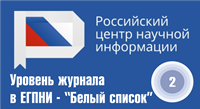АССОЦИАЦИЯ ПРОБЛЕМНОГО ИСПОЛЬЗОВАНИЯ СОЦИАЛЬНЫХ СЕТЕЙ С ПОКАЗАТЕЛЯМИ ТРЕВОГИ ПО ШКАЛЕ HADS У СТУДЕНТОВ МЕДИЦИНСКОГО УНИВЕРСИТЕТА
Аннотация
Аддиктивный потенциал социальных сетей хорошо известен. Однако данные о влиянии социальных сетей на психическое здоровье противоречивы. В некоторых исследованиях сообщается о пользе использования социальных сетей для психического здоровья. В свою очередь, данные других исследований показали, что широкое использование социальных сетей было связано с рядом психологических проблем и проблем психического здоровья, такими как депрессия, тревога и психологический стресс, особенно у молодых людей.
Цель. Изучить ассоциацию проблемного использования социальных сетей с показателями тревоги по шкале HADS у студентов медицинского университета.
Материалы и методы. В исследование было включено 229 студентов обоего пола, обучающихся на 3 курсе лечебного факультета медицинского университета. Анализ проблемного использования социальных сетей проводили с использованием русскоязычной версии опросника «The Social Media Disorder Scale». Выявление и оценку степени тяжести тревожных расстройств проводили, используя русскоязычную версию госпитальной шкалы тревоги и депрессии HADS.
Результаты. Установлено, что частота проблемного использования социальных сетей в общей группе обследованных студентов, обучающихся в медицинском университете, составила 9,6%. Наличие признаков тревоги выявлено у 34,9% обследованных студентов. Частота проблемного использования социальных сетей среди лиц, имеющих признаки тревоги, составила 59,1%. Среди обследованных девушек количество лиц, имеющих признаки тревоги с проблемным использованием социальных сетей, было в два раза больше по сравнению с пациентками без проблемного использования социальных сетей.
Заключение. Выявлены ассоциации проблемного использования социальных сетей с показателями тревоги по шкале HADS среди обучающихся в медицинском университете.
Скачивания
Литература
Список литературы
Давыдов Е.Л. Вопросы тревожно-депрессивных состояний у больных артериальной гипертонией старших возрастных групп // Клиническая геронтология. 2016. Т. 22, № 9-10. С. 22-23.
Деревянных Е.В., Балашова Н.А., Яскевич Р.А., Москаленко О.Л. Влияние интернет-аддикции на показатели тревоги у студентов медицинского вуза // Russian Journal of Education and Psychology. 2022. T. 13, № 4. С. 133-150. https://doi.org/10.12731/2658-4034-2022-13-4-133-150
Деревянных Е.В., Балашова Н.А., Яскевич Р.А., Москаленко О.Л. Частота и выраженность тревожно-депрессивных нарушений у студентов медицинского вуза // В мире научных открытий. 2017. Т. 9, № 1. С. 10-28. https://doi.org/10.12731/wsd-2017-1-10-28
Зотова Д.В., Розанов В.А. Патологическое использование и зависимость от социальных сетей – анализ с позиций феноменологии аддиктивного поведения // Вестник Санкт-Петербургского университета. Психология. 2020. Т. 10. Вып. 2. С. 158-183. https://doi.org/10.21638/spbu16.2020.204
Игнатова И.А., Яскевич Р.А., Шилов С.Н., Покидышева Л.И. Показатели качества жизни у слабослышащих мигрантов Крайнего Севера в период реадаптации к новым климатическим условиям // Российская оториноларингология. 2013. № 6 (67). С. 66-71.
Кочергина К.Н., Яскевич Р.А. Анализ уровня личностной и ситуативной тревожности у студентов медицинского университета // Международный студенческий научный вестник. 2017. № 6. С. 13.
Москаленко О.Л., Терещенко С.Ю., Яскевич Р.А. Влияние интернет-аддикции на показатели депрессии у студентов медицинского вуза // Russian Journal of Education and Psychology. 2022. Т.13, № 5. С. 118-135. https://doi.org/10.12731/2658-4034-2022-13-4-133-150
Москаленко О.Л., Яскевич Р.А. Тревожные расстройства среди обучающихся высших медицинских учебных заведений (обзор литературы) // Russian Journal of Education and Psychology. 2022. Т. 13, № 1-2. С. 120-127. https://doi.org/10.12731/2658-4034-2022-13-1-2-120-127
Яскевич Н.А., Лычаков А.С., Яскевич Р.А., Москаленко О.Л. Оценка роли хронобиологического типа личности в формировании интернет-аддиктивного поведения у школьников // Russian Journal of Education and Psychology. 2023. Т.14, № 1. С. 173-193. https://doi.org/10.12731/2658-4034-2023-14-1-173-193
Яскевич Н.А., Рыбин Е.А., Яскевич Р.А., Москаленко О.Л. Оценка взаимосвязи интернет-аддиктивного поведения и клипового мышления у школьников // Russian Journal of Education and Psychology. 2023. Т. 14, №2. С. 121-141. doi:10.12731/2658-4034-2023-14-2-121-141.
Яскевич Р.А., Игнатова И.А., Шилов С.Н. и др. Влияние тревожно-депрессивных расстройств на качество жизни слабослышащих мигрантов Крайнего Севера в период реадаптации к новым климатическим условиям // Современные проблемы науки и образования. 2014. № 4. С. 279.
Яскевич Р.А., Каспаров Э.В., Гоголашвили Н.Г. Расстройства депрессивного характера при метаболическом синдроме у мигрантов Крайнего Севера с артериальной гипертонией // Сибирский научный медицинский журнал. 2023. Т. 43. № 4. С. 123-131. https://doi.org/10.18699/SSMJ20230413
Яскевич Р.А., Кочергина К.Н., Каспаров Э.В. Влияние выраженности тревожно-депрессивных расстройств на качество жизни больных артериальной гипертонией // Siberian Journal of Life Sciences and Agriculture. 2019. Т. 11, № 5-2. С. 146-151. https://doi.org/10.12731/2658-6649-2019-11-5-2-146-151
Яскевич Р.А., Москаленко О.Л. Аффективные расстройства у женщин, имеющих хроническую ишемическую болезнь сердца в сочетании с метаболическим синдромом // Siberian Journal of Life Sciences and Agriculture. 2023. Т. 15. № 2. С. 284-302. https://doi.org/10.12731/2658-6649-2023-15-3-254-278
Яскевич Р.А., Москаленко О.Л. Аффективные расстройства у мужчин, имеющих хроническую ишемическую болезнь сердца в сочетании с метаболическим синдромом // Siberian Journal of Life Sciences and Agriculture. 2023. Т. 15. № 1. С. 327-345. https://doi.org/10.12731/2658-6649-2023-15-1-327-345
Alfaya M.A., Abdullah N.S., Alshahrani N.Z. et al. Prevalence and Determinants of Social Media Addiction among Medical Students in a Selected University in Saudi Arabia: A Cross-Sectional Study // Healthcare (Basel), 2023, no. 11(10), p. 1370. https://doi.org/10.3390/healthcare11101370
Billieux J., Maurage P., Lopez-Fernandez O. et al. Can Disordered Mobile Phone Use Be Considered a Behavioral Addiction? An Update on Current Evidence and a Comprehensive Model for Future Research // Curr. Addict. Rep., 2015, no. 2, pp. 156-162. https://doi.org/10.1007/s40429-015-0054-y
Cheng C., Ebrahimi O.V., Luk J.W. Heterogeneity of Prevalence of Social Media Addiction Across Multiple Classification Schemes: Latent Profile Analysis // J. Med. Internet. Res., 2022, no. 24(1), p. e27000. https://doi.org/10.2196/27000
Cheng C., Lau Y., Chan L., Luk J.W. Prevalence of social media addiction across 32 nations: Meta-analysis with subgroup analysis of classification schemes and cultural values // Addict. Behav., 2021, no. 117, p. 106845. https://doi.org/10.1016/j.addbeh.2021.106845
Digital 2023: Global Overview Report. Global Digital Insights. 2023. URL: https://datareportal.com/reports/digital-2023-global-overview-report (дата обращения: 15.09.2023).
Henzel V., Håkansson A. Hooked on virtual social life. Problematic social media use and associations with mental distress and addictive disorders // PLoS One, 2021, no. 16(4), p.e0248406. https://doi.org/10.1371/journal.pone.0248406
Hussain Z., Wegmann E., Yang H., Montag C. Social networks use disorder and associations with depression and anxiety symptoms: a systematic review of recent research in China // Front Psychol., 2020, no. 11, p. 211. https://doi.org/10.3389/fpsyg.2020.00211
Keles B., McCrae N., Grealish A. A systematic review: the influence of social media on depression, anxiety and psychological distress in adolescents // Int. J. Adolesc. Youth, 2019, no. 25(1), pp. 79-93. https://doi.org/10.1080/02673843.2019.1590851
Lai A.Y., Yeung W.F. Editorial: Mental health of higher education students // Front Psychiatry, 2022, vol. 13, p. 1089877. https://doi.org/10.3389/fpsyt.2022.1089877
Lee M.H.L., Kaur M., Shaker V. et al. Cyberbullying, Social Media Addiction and Associations with Depression, Anxiety, and Stress among Medical Students in Malaysia // Int. J. Environ. Res. Public. Health, 2023, no. 20(4), p. 3136. https://doi.org/10.3390/ijerph20043136
Lee-Won R.J., Herzog L., Park S.G. Hooked on Facebook: the role of social anxiety and need for social assurance in problematic use of Facebook // Cyberpsychol. Behav. Soc. Netw., 2015, no. 18(10), pp. 567-574. https://doi.org/10.1089/cyber.2015.0002
Lin S., Liu D., Niu G., Longobardi C. Active social network sites use and loneliness: the mediating role of social support and self-esteem // Curr. Psychol., 2020, no. 41(3), pp. 1279-1286. https://doi.org/10.1007/s12144-020-00658-8
Mao Y., Zhang N., Liu J. et al. A systematic review of depression and anxiety in medical students in China // BMC Med. Educ, 2019, no. 19(1), p. 327. https://doi.org/10.1186/s12909-019-1744-2
Meng S.Q., Cheng J.L., Li Y.Y. et al., Global prevalence of digital addiction in general population: a systematic review and meta-analysis // Clin Psychol Rev., 2022, no. 92, p. 102128. https://doi.org/10.1016/j.cpr.2022.102128.S0272-7358(22)00013-7
Orben A. Teenagers, screens and social media: a narrative review of reviews and key studies // Soc. Psychiatry. Psychiatr. Epidemiol., 2020, no. 55(4), pp. 407-414. https://doi.org/10.1007/s00127-019-01825-4.10.1007/s00127-019-01825-4
Plackett R., Sheringham J., Dykxhoorn J. The Longitudinal Impact of Social Media Use on UK Adolescents’ Mental Health: Longitudinal Observational Study // J. Med. Internet. Res., 2023, no. 25, p. e43213. https://doi.org/10.2196/43213
Quek T.T., Tam W.W., Tran B.X. et al. The Global Prevalence of Anxiety Among Medical Students: A Meta-Analysis // Int. J. Environ. Res. Public. Health, 2019, no. 16(15), pp. 361-370. https://doi.org/10.3390/ijerph16152735
Ruggieri S, Santoro G, Pace U. et al. Problematic Facebook use and anxiety concerning use of social media in mothers and their offspring: an actor-partner interdependence model // Addict. Behav. Rep., 2020, no. 11, p. 100256. https://doi.org/10.1016/j.abrep.2020.100256
Schou Andreassen C., Billieux J., Griffiths M.D. et al. The relationship between addictive use of social media and video games and symptoms of psychiatric disorders: a large-scale cross-sectional study // Psychol. Addict. Behav., 2016, no. 30(2), pp. 252-262. https://doi.org/10.1037/adb0000160.2016-13379-006
Sigerson L., Li A.Y., Cheung M.W., Cheng C. Examining common information technology addictions and their relationships with non-technology-related addictions // Comput. Human. Behav., 2017, no. 75, pp. 520-526. https://doi.org/10.1016/j.chb.2017.05.041
Van Den Eijnden R.J.J.M., Lemmens J.S., Valkenburg P.M. The social media disorder scale // Comput. Hum. Behav., 2016, no. 61, pp. 478-487. https://doi.org/10.1016/j.chb.2016.03.038
Zigmond A.S., Snaith R.P. The hospital anxiety and depression scale // Acta. Psychiatr. Scand., 1983, no. 67(6), pp. 361-70.
Žmavc M., Šorgo A., Gabrovec B. et al. The Protective Role of Resilience in the Development of Social Media Addiction in Tertiary Students and Psychometric Properties of the Slovenian Bergen Social Media Addiction Scale (BSMAS) // Int. J. Environ. Res. Public. Health, 2022, no. 19(20), p. 13178. https://doi.org/10.3390/ijerph192013178
References
Davydov E.L. Voprosy trevozhno-depressivnykh sostoyaniy u bol’nykh arterial’noy gipertoniey starshikh vozrastnykh grupp [Issues of anxiety-depressive states in patients with arterial hypertension of older age groups]. Klinicheskaya gerontologiya [Clinical Gerontology], 2016, vol. 22, no. 9-10, pp. 22-23.
Derevyannykh E.V., Balashova N.A., Yaskevich R.A., Moskalenko O.L. Vliyanie internet-addiktsii na pokazateli trevogi u studentov meditsinsk-ogo vuza [The influence of Internet addiction on anxiety scores in medi-cal students]. Russian Journal of Education and Psychology, 2022, vol. 13, no. 4, pp. 133-150. https://doi.org/10.12731/2658-4034-2022-13-4-133-150
Derevyannykh E.V., Balashova N.A., Yaskevich R.A., Moskalenko O.L. Chastota i vyrazhennost’ trevozhno-depressivnykh narusheniy u studentov meditsinskogo vuza [Frequency and severity of anxiety-depressive disorders in medical students]. V mire nauchnykh otkrytiy [In the world of scientific discoveries], 2017, vol. 9, no. 1, pp. 10-28. https://doi.org/10.12731/wsd-2017-1-10-28
Zotova D.V., Rozanov V.A. Patologicheskoe ispol’zovanie i zavisimost’ ot sotsial’nykh setey-analiz s pozitsiy fenomenologii addiktivnogo povedeniya [Pathological use and dependence on social networks - analysis from the standpoint of the phenomenology of addictive behavior]. Vestnik Sankt-Peterburgskogo universiteta. Psikhologiya [Bulletin of St. Petersburg University], 2020, vol. 10, no. 2, pp. 158-183. https://doi.org/10.21638/spbu16.2020.204
Ignatova I.A., Yaskevich R.A., Shilov S.N., Pokidysheva L.I. Pokazateli kachestva zhizni u slaboslyshashchikh migrantov Kraynego Severa v period readaptatsii k novym klimaticheskim usloviyam [Indicators of quality of life among hearing-impaired migrants of the Far North during the period of readaptation to new climatic conditions]. Rossiyskaya otorinolaringologiya [Russian Otorhinolaryngology], 2013, no. 6(67), pp. 66-71.
Kochergina K.N., Yaskevich R.A. Analiz urovnya lichnostnoy i situativnoy trevozhnosti u studentov meditsinskogo universiteta [Analysis of the level of personal and situational anxiety among students of a medical university]. Mezhdunarodnyy studencheskiy nauchnyy vestnik [International Student Scientific Bulletin], 2017, no. 6, pp. 13.
Moskalenko O.L., Tereshchenko S.Yu., Yaskevich R.A. Vliyanie internet-addiktsii na pokazateli depressii u studentov meditsinskogo vuza [The influence of Internet addiction on depression indicators in medical students]. Russian Journal of Education and Psychology, 2022, vol. 13, no. 5, pp. 118-135. https://doi.org/10.12731/2658-4034-2022-13-4-133-150
Moskalenko O.L., Yaskevich R.A. Trevozhnye rasstroystva sredi obuchayushchikhsya vysshikh meditsinskikh uchebnykh zavedeniy (obzor literatury) [Anxiety disorders among medical students (literature review)]. Russian Journal of Education and Psychology, 2022, vol. 13, no. 1-2, pp. 120-127. https://doi.org/10.12731/2658-4034-2022-13-1-2-120-127
Yaskevich N.A., Lychakov A.S., Yaskevich R.A., Moskalenko O.L. Otsenka roli khronobiologicheskogo tipa lichnosti v formirovanii internet-addiktivnogo povedeniya u shkol’nikov [Evaluation of the role of the chronobiological personality type in the formation of Internet addictive behavior in schoolchildren]. Russian Journal of Education and Psychology, 2023, vol. 14, no. 1, pp. 173-193. https://doi.org/10.12731/2658-4034-2023-14-1-173-193
Yaskevich N.A., Rybin E.A., Yaskevich R.A., Moskalenko O.L. Otsenka vzaimosvyazi internet-addiktivnogo povedeniya i klipovogo myshleniya u shkol’nikov [Evaluation of the relationship between Internet addictive behavior and clip thinking in schoolchildren]. Russian Journal of Education and Psychology, 2023, vol. 14, no. 2, pp. 121-141. https://doi.org/10.12731/2658-4034-2023-14-2-121-141
Yaskevich R.A., Ignatova I.A., Shilov S.N. i dr. Vliyanie trevozhno-depressivnykh rasstroystv na kachestvo zhizni slaboslyshashchikh migrantov Kraynego Severa v period readaptatsii k novym klimaticheskim usloviyam [Influence of anxiety-depressive disorders on the quality of life of hearing-impaired migrants of the Far North during the period of readaptation to new climatic conditions]. Sovremennye problemy nauki i obrazovaniya [Modern problems of science and education], 2014, no. 4, p. 279.
Yaskevich R.A., Kasparov E.V., Gogolashvili N.G. Rasstroystva depressivnogo kharaktera pri metabolicheskom sindrome u migrantov Kraynego Severa s arterial’noy gipertoniey [Depressive disorders in metabolic syndrome among migrants of the Far North with arterial hypertension]. Sibirskiy nauchnyy meditsinskiy zhurnal [Siberian Scientific Medical Journal], 2023, vol. 43, no. 4, pp. 123-131. https://doi.org/10.18699/SSMJ20230413
Yaskevich R.A., Kochergina K.N., Kasparov E.V. Vliyanie vyrazhennosti trevozhno-depressivnykh rasstroystv na kachestvo zhizni bol’nykh arterial’noy gipertoniey [The influence of the severity of anxiety-depressive disorders on the quality of life of patients with arterial hypertension]. Siberian Journal of Life Sciences and Agriculture, 2019, vol. 11, no. 5-2, pp. 146-151. https://doi.org/10.12731/2658-6649-2019-11-5-2-146-151
Yaskevich R.A., Moskalenko O.L. Affektivnye rasstroystva u zhenshchin, imeyushchikh khronicheskuyu ishemicheskuyu bolezn’ serdtsa v sochetanii s metabolicheskim sindromom [Affective disorders in women with chronic ischemic heart disease in combination with metabolic syndrome]. Siberian Journal of Life Sciences and Agricultur, 2023, vol. 15, no. 2, pp. 284-302. https://doi.org/10.12731/2658-6649-2023-15-3-254-278
Yaskevich R.A., Moskalenko O.L. Affektivnye rasstroystva u muzhchin, imeyushchikh khronicheskuyu ishemicheskuyu bolezn’ serdtsa v sochetanii s metabolicheskim sindromom [Affective disorders in men with chronic ischemic heart disease in combination with metabolic syndrome]. Siberian Journal of Life Sciences and Agriculture, 2023, vol. 15, no. 1, pp. 327-345. https://doi.org/10.12731/2658-6649-2023-15-1-327-345
Alfaya M.A., Abdullah N.S., Alshahrani N.Z. et al. Prevalence and Determinants of Social Media Addiction among Medical Students in a Selected University in Saudi Arabia: A Cross-Sectional Study. Healthcare (Basel), 2023, no. 11(10), p. 1370. https://doi.org/10.3390/healthcare11101370
Billieux J., Maurage P., Lopez-Fernandez O. et al. Can Disordered Mobile Phone Use Be Considered a Behavioral Addiction? An Update on Current Evidence and a Comprehensive Model for Future Research. Curr. Addict. Rep., 2015, no. 2, pp. 156-162. https://doi.org/10.1007/s40429-015-0054-y
Cheng C., Ebrahimi O.V., Luk J.W. Heterogeneity of Prevalence of Social Media Addiction Across Multiple Classification Schemes: Latent Profile Analysis. J. Med. Internet. Res., 2022, no. 24(1), p. e27000. https://doi.org/10.2196/27000
Cheng C., Lau Y., Chan L., Luk J.W. Prevalence of social media addiction across 32 nations: Meta-analysis with subgroup analysis of classification schemes and cultural values. Addict. Behav., 2021, no. 117, p. 106845. https://doi.org/10.1016/j.addbeh.2021.106845
Digital 2023: Global Overview Report. Global Digital Insights. 2023. URL: https://datareportal.com/reports/digital-2023-global-overview-report
Henzel V., Håkansson A. Hooked on virtual social life. Problematic social media use and associations with mental distress and addictive disorders. PLoS One, 2021, no. 16(4), p.e0248406. https://doi.org/10.1371/journal.pone.0248406
Hussain Z., Wegmann E., Yang H., Montag C. Social networks use disorder and associations with depression and anxiety symptoms: a systematic review of recent research in China. Front Psychol., 2020, no. 11, p. 211. https://doi.org/10.3389/fpsyg.2020.00211
Keles B., McCrae N., Grealish A. A systematic review: the influence of social media on depression, anxiety and psychological distress in adolescents. Int. J. Adolesc. Youth, 2019, no. 25(1), pp. 79-93. https://doi.org/10.1080/02673843.2019.1590851
Lai A.Y., Yeung W.F. Editorial: Mental health of higher education students. Front Psychiatry, 2022, vol. 13, p. 1089877. https://doi.org/10.3389/fpsyt.2022.1089877
Lee M.H.L., Kaur M., Shaker V. et al. Cyberbullying, Social Media Addiction and Associations with Depression, Anxiety, and Stress among Medical Students in Malaysia. Int. J. Environ. Res. Public. Health, 2023, no. 20(4), p. 3136. https://doi.org/10.3390/ijerph20043136
Lee-Won R.J., Herzog L., Park S.G. Hooked on Facebook: the role of social anxiety and need for social assurance in problematic use of Facebook. Cyberpsychol. Behav. Soc. Netw., 2015, no. 18(10), pp. 567-574. https://doi.org/10.1089/cyber.2015.0002
Lin S., Liu D., Niu G., Longobardi C. Active social network sites use and loneliness: the mediating role of social support and self-esteem. Curr. Psychol., 2020, no. 41(3), pp. 1279-1286. https://doi.org/10.1007/s12144-020-00658-8
Mao Y., Zhang N., Liu J. et al. A systematic review of depression and anxiety in medical students in China. BMC Med. Educ, 2019, no. 19(1), p. 327. https://doi.org/10.1186/s12909-019-1744-2
Meng S.Q., Cheng J.L., Li Y.Y. et al., Global prevalence of digital addiction in general population: a systematic review and meta-analysis. Clin Psychol Rev., 2022, no. 92, p. 102128. https://doi.org/10.1016/j.cpr.2022.102128.S0272-7358(22)00013-7
Orben A. Teenagers, screens and social media: a narrative review of reviews and key studies. Soc. Psychiatry. Psychiatr. Epidemiol., 2020, no. 55(4), pp. 407-414. https://doi.org/10.1007/s00127-019-01825-4.10.1007/s00127-019-01825-4
Plackett R., Sheringham J., Dykxhoorn J. The Longitudinal Impact of Social Media Use on UK Adolescents’ Mental Health: Longitudinal Observational Study. J. Med. Internet. Res., 2023, no. 25, p. e43213. https://doi.org/10.2196/43213
Quek T.T., Tam W.W., Tran B.X. et al. The Global Prevalence of Anxiety Among Medical Students: A Meta-Analysis. Int. J. Environ. Res. Public. Health, 2019, no. 16(15), pp. 361-370. https://doi.org/10.3390/ijerph16152735
Ruggieri S, Santoro G, Pace U. et al. Problematic Facebook use and anxiety concerning use of social media in mothers and their offspring: an actor-partner interdependence model. Addict. Behav. Rep., 2020, no. 11, p. 100256. https://doi.org/10.1016/j.abrep.2020.100256
Schou Andreassen C., Billieux J., Griffiths M.D. et al. The relationship between addictive use of social media and video games and symptoms of psychiatric disorders: a large-scale cross-sectional study. Psychol. Addict. Behav., 2016, no. 30(2), pp. 252-262. https://doi.org/10.1037/adb0000160.2016-13379-006
Sigerson L., Li A.Y., Cheung M.W., Cheng C. Examining common information technology addictions and their relationships with non-technology-related addictions. Comput. Human. Behav., 2017, no. 75, pp. 520-526. https://doi.org/10.1016/j.chb.2017.05.041
Van Den Eijnden R.J.J.M., Lemmens J.S., Valkenburg P.M. The social media disorder scale. Comput. Hum. Behav., 2016, no. 61, pp. 478-487. https://doi.org/10.1016/j.chb.2016.03.038
Zigmond A.S., Snaith R.P. The hospital anxiety and depression scale. Acta. Psychiatr. Scand., 1983, no. 67(6), pp. 361-70.
Žmavc M., Šorgo A., Gabrovec B. et al. The Protective Role of Resilience in the Development of Social Media Addiction in Tertiary Students and Psychometric Properties of the Slovenian Bergen Social Media Addiction Scale (BSMAS). Int. J. Environ. Res. Public. Health, 2022, no. 19(20), p. 13178. https://doi.org/10.3390/ijerph192013178
Просмотров аннотации: 579
Copyright (c) 2024 Roman A. Yaskevich, Olga L. Moskalenko

Это произведение доступно по лицензии Creative Commons «Attribution-NonCommercial-NoDerivatives» («Атрибуция — Некоммерческое использование — Без производных произведений») 4.0 Всемирная.





































